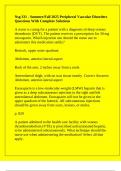Exam (elaborations)
NSG331 Marian University -Nsg 331 - Summer/Fall 2025 Peripheral Vascular Disorders Questions With Complete Solutions
- Course
- NSG331
- Institution
- Marian University
NSG331 Marian University -Nsg 331 - Summer/Fall 2025 Peripheral Vascular Disorders Questions With Complete Solutions
[Show more]



